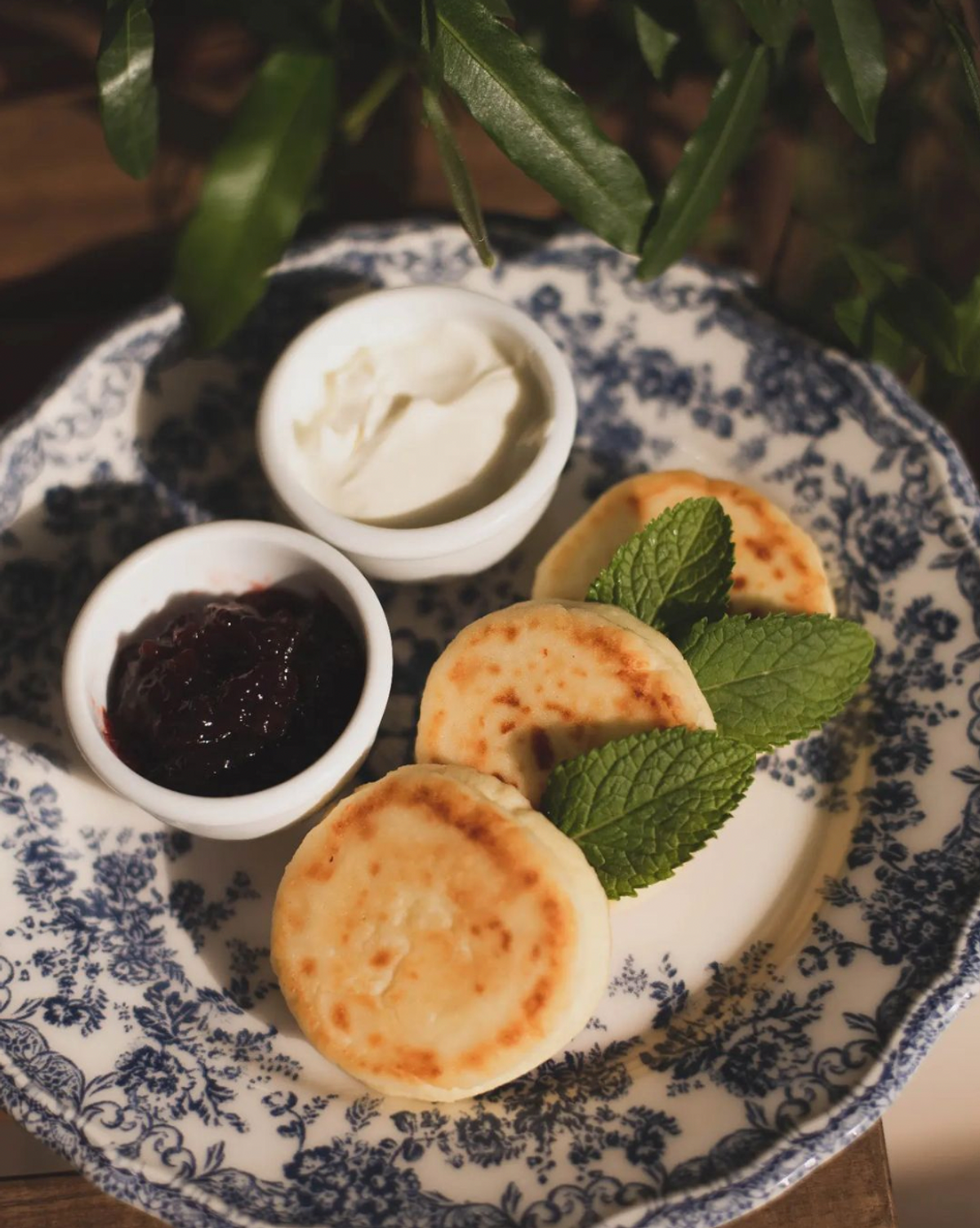The New Flavors of Israel
Recent immigrants from Ukraine, Russia, and Belarus are changing what’s on the menu—from cafes to bars



Since early 2020, first due to the pandemic, and, most recently, during the war in Ukraine, Israel has been experiencing a slow yet persistent wave of immigration from Russia, Ukraine, and Belarus. Last February alone, according to the Ministry of Aliyah and Integration, saw close to 40,000 immigrants—the highest number of people making aliyah from the region since the early 1990s. Alongside the usual challenges—like Hebrew classes shortages and employment deficit—these new, social media-savvy, young, cosmopolitan olim face surprises on the culinary front. The Israeli dining and drinking scene, as advanced and trend-driven as it may be, doesn’t necessarily have some of the key elements newcomers have grown accustomed to in their home countries.
In recent months, those new immigrants who nurture a business streak are taking matters into their own hands.
“I had the idea of opening a cafe like in Kyiv—to do what I know and add variety and some culture, rather than fitting in into the local market,” said one such Ukrainian entrepreneur, Michael Katash, 37. His new coffee shop, Kashtan, opened in Haifa this past April. Katash himself came to the country from Kyiv in January 2021 with his family. In the Ukrainian capital, he still owns several coffee shops and has been, most recently, active in the bean-roasting industry. His first Israeli venture, Kashtan (chestnut, in Russian) recently rose to prominence following a viral, much-memed post in a Facebook group for new Russian-speaking immigrants, in which a woman wondered about the Israeli coffee shops’ lack of her favorite fall drink from St. Petersburg: the pumpkin spice latte.
The drink that divides U.S consumers every cold season is insanely popular, the post had demonstrated, in Russia—as well as the raf, a specialty, cream- and syrup-fueled coffee drink that was invented in Russia some 20 years ago and has become a persistent hit. Kashtan proudly serves both, as well as the bumble—another coffee drink popular in Spain and Eastern Europe that is made with orange juice and caramel—and a plethora of other coffee drinks previously unfamiliar to the Israeli connoisseur. “In Israel there’s short and tall espresso, and hafuch”—literally meaning “upside down,” but here referring to a foamy coffee drink popular in Israel—“which, if you order, you might end up with a latte or a cappuccino,” said Katash. “The Israeli coffee culture is lacking in some spots, which is strange, because Israelis travel a lot, and try coffee all over the world—so why not try new things here?”
A desire to innovate while building up on expertise from home also inspired Noah Vitkind and his wife, Ayelet, who came to Israel from St. Petersburg in 2021. The two fell in love with the southern city of Beersheva and, having spent about a year acquiring experience in the local hospitality industry, decided to open a typical St. Petersburg bar, aptly named Makom Aher (a different/other place in Hebrew). Tapping into their bartending experience, the couple decidedly colored outside of the lines in creating the space. On the food menu, rather than finger food, a syrupy fruit cake created from a recipe of Vitkind’s mom steals the spotlight, and the music is muted in favor of conversation and connection; Vitkind deems local bars to be typically too loud.

“We tried to recreate a corner of St. Petersburg with its level of mixology,” said Vitkind. “Our record is one to one and a half minutes per making a cocktail, while from our experience, in Israel you can wait for 20 to 30 minutes until a server even comes along. We want to show that the quality of service exists.” While the bar has become incredibly popular with Russian-speaking patrons, the local Hebrew-speaking clientele, Vitkind said, can be suspicious at first. But once people warm up to the idea of a “Russian bar” they’re pleasantly surprised. Vitkind is also quick to mention that among the customers are bartenders from Tel Aviv, who “say that they haven’t seen anything like that in Tel Aviv—we’re very meticulous in our cocktail menus, we don’t allow any changes, we make our daiquiris with lime juice only, we mind the little details.”
Both Katash and Vitkind say they wish to fill an empty niche in the local market, while moving the Israeli hospitality industry forward. In Tel Aviv, the pinnacle of the country’s restaurant and mixology scene, entrepreneur Daniil Goldman, 31, has similar sentiments: In the next couple of weeks, Goldman, who moved to Israel from Moscow in February, will open Chaseria, a cocktail bar in the heart of the city’s most lively nightlife hub, Nachlat Binyamin Street. His edge is homemade tinctures and infusions that will go into the cocktails: cherry-infused bourbon, raspberry-infused gin, and more. Goldman owns several bars in Moscow. At Chaseria, for which he partnered with bartender Jacob Shteyntsayg and additional local shareholders, Goldman is hoping to upgrade the level of mixology he’d experienced in the country so far. “The cocktail scene in Tel Aviv is relatively new, but it’s improving and developing,” he said. “I certainly haven’t seen infusions like we’re about to offer, anywhere.”
This entrepreneurial and possibly critical approach has already earned the new immigrants a pampered, elitist image in some circles—the pumpkin latte conundrum, for example, elicited many eye rolls from Russian immigrants who settled in Israel in the ’90s, and who, before the internet and after the collapse of the USSR, didn’t have the resources or expectations of the current wave. Additionally, this new aliyah has a fundamentally different relationship with Israel: Unlike the immigrants of the ’90s, who previous to arrival had known Israel only from letters of their relatives or tales of Sochnut agents, many of the current olim have been to the country before making the big move, some several times, for vacation or work purposes—which allowed them to explore the local business landscape and plan their move.
But while the motivations to call Israel home are different in 2022 than they were in 1992, and the circumstances are nothing alike, one thing remains a commonality: a nostalgia for familiarity, awakened by a new reality in a foreign country. Back in the ’90s, it was nostalgia for Soviet-era products like condensed milk and salami. In this day and age, it might very well mean a frothy coffee drink or a well-measured cocktail with a side of mother’s cake. Or, as Israel’s most recent trend shows, it’s syrniki: fluffy, sweet pancakes made from farmer cheese and traditionally served with sour cream and jam.
The very common Russian breakfast or teatime item, which can be found in myriad coffee shops in Russian-speaking countries, had recently created a social media frenzy after appearing, in a timely fashion, on the menu of Coffee Point, a year-old cafe in Tel Aviv. The coffee shop, located on the central Dizengoff Street, doesn’t identify as Russian at all, but it does belong to a family of Russian immigrants who came to the country several years ago. Since syrniki have been added to the menu, several Russian-speaking Instagram influencers—including some who have been living in the country for over a decade—paid a visit to the cafe, spreading the news and creating hype about the dish, previously unknown to the local coffee shop landscape. The Russian-speaking customers, newcomers and veterans alike, have been melting into puddles of joy on Instagram, and Israelis are warming up to them, too. The dish also recently joined the menu at Mashu Hadash, a new art and creative collective in Haifa, founded by Russian immigrants.
“I was so happy to see them on the menu,” said Kseniya Waisman, a newcomer to Israel, who recently paid a visit to Coffee Point to sample her favorite treat. “This was bound to happen, given the massive waves of immigration from Russia, Ukraine, and Belarus.” Waisman left Moscow, where she has a background in restaurant management, in March this year. “Syrniki is home, it’s Mom making them, it’s a slow weekend breakfast, it’s love since childhood,” she said.
And this is only the beginning: According to official forecasts by the Israeli government, many more people are expected to arrive in 2023, bringing their own culinary cravings and particularities. “Right now, there’s a great aliyah from Moscow and Ukraine and Belarus—the smartest, youngest, most creative people,” Goldman said. “This strong cultural impact won’t leave the city unchanged. I want to believe this aliyah will take the best of Israeli culture and add their own twist to it.”
Flora Tsapovsky is a San Francisco-based food and culture writer.